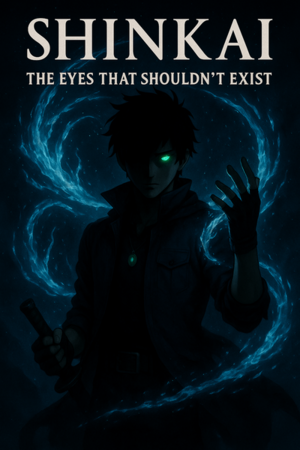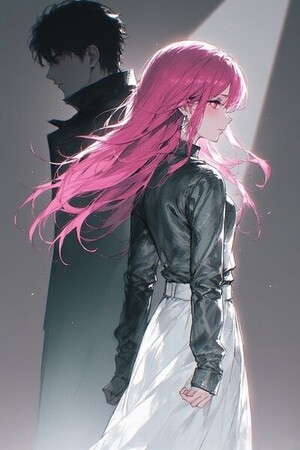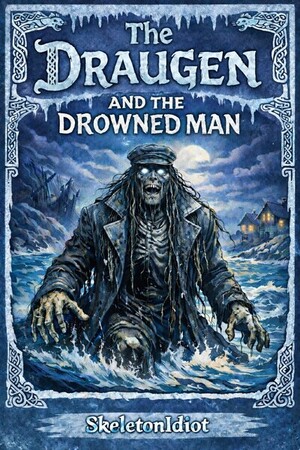Chapter 3:
The Solar Spear
Mutual Monster
I allowed an estimated fortnight to pass. For that duration, I planned my escape. Not only could I not stand another three months in the infirmary, I feared how these “Venator captains” would react to my existence. My answers had irritated that woman, Amborella, so it was possible the captains would find disposing of me to be easiest. As for my escape efforts…
It started when I changed my focus from the wrist binding to the cot’s post. By contorting my body around and around in a feat of gymnastics I hadn’t thought possible, I found the post unscrewed from the cot’s main supports. This done, I was free to explore the room. But, as I expected, my legs were weak. I half-crawled, half-limped to search for tools. On the metal countertop I found pliers, scalpels, bandages, a hacksaw, and a small blackboard with two sticks of thumb-sized chalk. The hacksaw seemed the most useful; a couple test swipes proved it was capable of sawing through the wrist binding. I didn’t do it straight away, so as to not alert the tongueless girl who brought meals.
For the remaining time, I tried to get my body working. It started with stretches. I’d lost any of the flexibility my previous degree of fitness imbued, so I focused on the simple task of touching my toes. The initial sharp, prickling sensation faded after a few days, as it became easier to warm-up, and it felt like my body “remembered” its old state. Next I tried squats and push-ups, until I felt capable of fleeing the infirmary without my limbs failing.
Throughout these efforts, luckily, the door screeched loud enough to warn me of the tongueless girl.
During one such visit, I gestured to the countertop and mentioned seeing a blackboard. The girl nodded but didn’t move. Under normal circumstances, I would’ve asked her politely, but given the necessity I lowered my voice and commanded:
‘Bring it to me.’
I internally winced at how the girl flinched and hastened to obey. What had happened? Rather, what type of world created someone like her? I resolved to not involve her in the actual escape. ‘What’s your name?’ I asked. She shook her head and pointed to her open mouth, so I offered her the blackboard and chalk. Even then, she hesitated. ‘I wanted to thank you,’ I claimed. ‘And…that Venator, Amborella—she wanted me to get acquainted with the area before I was strong enough to leave.’ After an extra moment of hesitation, the girl wrote:
‘Wursha.’
The “Wur” was written in English letters, while “sha” used katakana. I tested the pronunciation and asked her confirm I’d said it correctly. After a couple attempts, I found that the emphasis was on the second syllable.
‘Wursha,’ I said. ‘Where are we?’
‘Second-level,’ she wrote.
I wasn’t familiar with the area and asked her to outline the surroundings. With precise lines, Wursha drew a labelled map. With a few more questions I pieced together that going left from the infirmary went toward lodging and a recreation hall, while going right led to a mess hall and mining site. ‘What about going outside?’
Wursha erased the map and drew another. It depicted a significant distance between the infirmary and some sort of exit. A gate? Though I’d been found in the mining site, I made the exit my target. I wanted to get a sense of the current building’s location. There was a chance (desperate hope, actually) it wasn’t far from the base. From there, I could search for clues about what happened.
I doubted it wise to broach the topic, but I had to know the extent of rules and punishments. ‘Why…don’t you have a tongue?’
Wursha pursed her lips and tapped the chalk against the blackboard. ‘No discipline,’ she wrote.
I didn’t understand, but I couldn’t bring myself to press the topic. Either way, I needed to leave.
#
With Wursha’s help, I got a sense of time. So, when “midnight” came, I began to saw at my wrist binding. I smothered the coarse sound of the hacksaw’s teeth with a pillow, but it still filled the room. By sawing with agonisingly slow speeds, arm aching and numb, I broke through. I rubbed my reddened wrist and crept to the door.
How could I handle the guard? I wasn’t about to kill him, but chances at distraction were limited. Could he be convinced Amborella wanted me to leave? That seemed like the best option, and I didn’t want to waste more time. I opened the screeching door and…
Nobody stood outside.
Even better, I thought.
I oriented myself based on Wursha’s map to the building’s exit and crept out of the infirmary. I found myself in a windowless hallway of corrugated steel, rolling shutters, and overhead wires. A pervasive, acrid smell wafted upward. The floor was a mess of rotted planks, shallow puddles, and litter. A harsh, bluish-white glow illuminated the hallway at sparse intervals, forcing me to progress slowly through the dark. The plastic slippers I wore didn’t provide much protection. The area was silent, save a dull thrum, like a distant engine.
I made it a dozen steps when a door opened ahead. I whirled around. There weren’t any gaps to hide inside, and the nearest shutters were locked. Act casual, I thought. Walk with purpose and nobody will question you. Striding forward, chest out, I feigned indifference. From the opened door, a man exited. He re-clasped his belt. A toilet and basin showed behind. He wore a metal helmet and a hatchet hung from his leather belt. He looked familiar. Too familiar. It…was the infirmary’s guard. I walked faster. This act-casual-and-walk-fast tactic worked for one-and-a-half seconds. ‘Hey,’ he grumbled. ‘What’re you doing up?’ He spoke like I were a peer.
‘…Needed to piss,’ I replied.
‘I’d give it a long minute,’ he chuckled, shuffling aside.
To maintain the lie, I stepped toward the doorway. Yellow light spilled out and illuminated my face. The guard squinted, features visibly changing as he discovered my identity. ‘You’re—’
I didn’t give him a chance to speak. A quick shove should’ve pushed him into the toilet, but he caught the doorframe and righted himself. His new position blocked my path. Fighting wasn’t an option. I spun and sprinted back the way I’d come. With luck, there would be a way to circle back to the gate.
My plastic slippers slapped against ceramic and splashed in shallow puddles, but I pressed on. The new path led toward the mess hall and mining site, neither of which I wanted to visit. My body had regained enough strength to evade the guard, but he’d called my name and, sensing a folly pursuit, diverted to gather reinforcements. I needed to find another path. Imagining a wave of guards coming to find me, I stumbled through the quiet passages in a daze. How big was the building? Where were the windows? Where were the people?
In my wild wanderings, I passed odd assortments of chambers, rooms, and halls, with sizes varying from closets to cavernous spaces like gothic cathedrals. Observe, now, and sense as I sensed:
See the tiled checkerboard floor of a white-walled room filled with brass apparatus and shallow basins. See the circular copper sheets hammered into dishes. See the wiring and scuttling rats gnawing at the rubber insulation. See the stained plastic pails, buckets, and deep tin bowls with string and wooden dowels threaded through a pair for easier carrying. See the kaleidoscopic, neon glare.
Smell the coal, fuel, and sweat, each baked into the very walls. Smell the smoke. Scented smoke. Acrid smoke. Steamy smoke. Dulling smoke. Stimulating smoke.
Hear the creak, groan, and hiss of the motley passages, as if living arteries and veins pumping me through and onward to – where?
How big could a single building be?
Though unguided and panicked, I neared a source of pure light. Like a moth, I ambled toward it. Yes. Sunlight. Plastic and canvas sheets hung from endless rows of hooks, while glass sheets formed individual rooms. The metal hallway traced this area, and I unknowingly crossed a low chain that served as a barrier. I lifted the canvas, slid open a glass door, and stepped into greenhouse, of sorts. Various plants grew in pots and troughs, but still the sunlight held my attention. It waited further beyond. I advanced on slow, shuffling steps. When I reached a metal railing, the edge, I grasped the extent of the surrounding environment.
The greenhouses formed an enormous ring, like a stadium’s seats. The middle, where the field would be, was hollow. I craned my head upward: Sunlight came from high above, through a circle reaching…the sky. I peered down. The emptiness plunged to soil, not far from where I stood. If I stood on the second-level, how many levels were above? Ten? Twenty? It felt difficult to grasp the scale, but…
Never had I observed so large a building.
No, not a building. Buildings. Multiple merged, as if skin fused. A single, endless structure. A city. The City. Amborella’s earlier statements finally made sense. I wouldn’t have understood had the sight not been so immense. As if prompted by fate, I spotted a piece of cardboard hanging from the nearest shelf of plants. It depicted a crude charcoal drawing titled:
‘The City.’
I suspected the capitalisation wasn’t a grammatical error. In the world I’d awoken into there was no point naming the place. When there is only one of something, it gained exclusive rights to its own existence. Imagine living in a small village and never knowing any others. It would be the village. The river would be the river. Well, the sprawling mess of rooms, halls, and levels, comprised the City.
I traced my finger down along the middle of the map, the largest and only empty space in the drawing. It read:
‘Solar Spear.’
That must have been where I stood. The name was descriptive and correct. The open cylinder resembled a spear of sunlight plunged through the City. So, I was on the second level in the middle of the City.
And…I no longer knew what to do.
In this lost, unfocused state, at last I noticed the surroundings. Vegetables and fruits grew. Some I recognised, like corn, potatoes, and plums, while others appeared alien. One grew in a wide square of soil and reminded me of a melon in terms of size, but there the similarities ended. The skin was translucent, like a membrane, showing a greenish inner rind. Drawn to it, I prodded the skin. The membrane was tougher than I imagined, textured like a fuzzy peach. I laughed. It felt like the first laugh in years. My amusement was met with shouts, as figures in thick, protective suits emerged from the adjacent greenhouses. They didn’t ask about my identity or purpose. As they rushed to apprehend me, I was forced to flee anew.
This second escape didn’t go like the first. The suited figures had agility and dedication. Judging by their readiness to apprehend me, nobody but them was allowed to enter the “Solar Spear” area. They chased me back toward the infirmary, down a spiral staircase, and through a hall filled with rows of people eating. Those who ate looked like miners, but I couldn’t stop to wonder. The maybe-miners watched me sprint through the hall. In addition my pursuers speed, they knew the City’s layout. As I burst from the hall, more pursuers converged from sidelong passages. One path remained open:
The mining site.
I sprinted down the spiral staircase, taking them two at a time, and skipped the last few entirely. Glowing insects scuttled around the walls, and I followed their light to a rope ladder. Shouts echoed from above, as one of my pursuers had tripped on the staircase and become an obstacle.
There were fewer lights at the bottom of the rope ladder. My chest heaved and thigh muscles prickled with the hot pain of physical strain. As my heart pounded in my ears, I pressed against a wall of dirt and listened for pursuers. Their footfalls led away, further down a different passage of the mines. Back to square one, I thought. Or minus one—
A gloved hand enclosed around my mouth.




Please sign in to leave a comment.